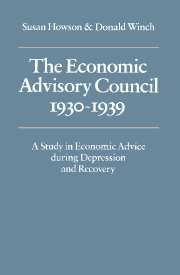4 - ECONOMIC ADVICE DURING THE CRISIS
Published online by Cambridge University Press: 07 October 2011
Summary
The Treasury and the Bank of England were aware of the possibility of a balance-of-payments crisis from the beginning of 1931. This determined to a large extent the policy of the second Labour Government in the last few months of its life. In January Hopkins submitted evidence on behalf of the Treasury to the Royal Commission on Unemployment Insurance which stressed the effect of an unbalanced budget on foreign confidence: ‘continued state borrowing on the present vast scale without adequate provision for repayment would quickly call in question the stability of the British financial system’. This confirmed the Opposition's fears and provided ammunition for the campaign on public economy. As a result of a Conservative censure motion and a Liberal amendment on the lines of their suggestions in How to Tackle Unemployment, the government set up the Committee on National Expenditure under Sir George May in February to suggest ways of reducing public expenditure. The report of this committee, which consisted of five members (including the chairman) representing business interests, four of whom the Conservatives and the Liberals nominated, and two trade union representatives, was to figure prominently in the political crisis in August.
In January Snowden had warned his Cabinet colleagues in no uncertain terms that the financial situation was a ‘grim one … As each month passes with no sign of a lifting of the world economic crisis, the financial prospect constantly and steadily deteriorates.’
- Type
- Chapter
- Information
- The Economic Advisory Council, 1930–1939A Study in Economic Advice during Depression and Recovery, pp. 82 - 105Publisher: Cambridge University PressPrint publication year: 1977



